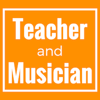Over the last few years, I’ve been lucky enough to do some work with Musical Futures. It’s always a...
Interview: Philip Flood of Sound Connections
 I recently had the pleasure of attending the Teach Through Music Final Conference, which gave me the opportunity to meet Philip Flood. I’ve been aware of Philip’s work with Sound Connections for some time and had enjoyed the occasional conversation over email and Twitter but we had never actually met in the flesh. Our paths crossed very briefly at the conference, so I made a point of asking if he’d be interested in answering a few questions for Teacher and Musician. I’m delighted that he did because his responses below provide great reading for anyone involved in music education.
I recently had the pleasure of attending the Teach Through Music Final Conference, which gave me the opportunity to meet Philip Flood. I’ve been aware of Philip’s work with Sound Connections for some time and had enjoyed the occasional conversation over email and Twitter but we had never actually met in the flesh. Our paths crossed very briefly at the conference, so I made a point of asking if he’d be interested in answering a few questions for Teacher and Musician. I’m delighted that he did because his responses below provide great reading for anyone involved in music education.
When you’re at a networking event/conference and someone comes up to you, looks at your name badge and says “Philip Flood? So what do you do?” how would you respond?
My initial response would be to say correct! And then try and find out a bit about them or how they know me or Sound Connections. I strongly believe in opportunities to network in a room, which is why we organise two ‘Would Like to Meet…’ events each year. These structured but informal evenings bring together people from across the music education sector in London and are a great opportunity to catch up with colleagues and meet new ones. In the past, people who have attended have ended up with jobs, funding and other opportunities. Sound Connections staff are always on hand to help those who might feel a little awkward approaching someone they have wanted to meet for a long time. That’s our role, literally, to connect.
Sound Connections works with some of the young people who could easily fall through the system. If you could pick out one particular success story for this, then what would it be?
I would find it hard to pick one particular individual but I would highlight the success of our youth engagement programme Wired4Music, which celebrates its fifth birthday this year. This is a unique young Londoners music council, open to anyone 16-25 years old, who has a passion for music. We currently have around 500 members from every London borough, with a core group of around 50 young people all active in making music, planning events and advocating for the power of music across the capital. I’ve seen young people join this and, through getting involved, become more and more confident in themselves. It has transformed lives in some cases. We are now planning the next five years and have recently launched an individual giving campaign to help secure the future of the programme. It’s great that Youth Music are also funding this work but we want to do more, and involve many more young people.
What can school music teachers do to make a positive difference to the pupils you work with?
School music teachers are central to the development of all young people they work with. For me they are role models and the best thing they can do is act and behave as musicians. I have seen some phenomenal music teachers and what they all share is a passion for making music and an ability to listen and respond to the needs of young people. We have recently been working with Key Stage 3 teachers across London through a programme called Teach Through Music. What has been most interesting is how teachers learn from each other, from both discussing how they work and observing each other’s practice. We are planning the next phase of this programme and will be announcing further details in the autumn. We are committed to continuing to support all music teachers, both in and out of school, in the capital.
If you could have one wish for music education, then what would it be?
That it would be properly recognised by government and that music, and the other arts subjects, are a core part of the curriculum and fully supported by headteachers in schools.
That’s not much to ask, is it?
